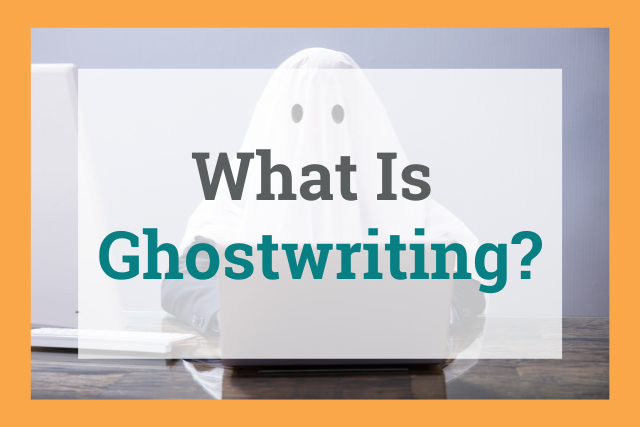
You might have heard that ghostwriting is one of the most well-paid writing careers. It’s true—being a ghostwriter can be a lucrative option.
So what exactly is a ghostwriter?
The short answer is that a ghostwriter is a writer whose name doesn’t appear on the final work.
In this article, we’ll give you a rundown of what this industry requires and ten tips on how to get started as a ghostwriter.
What Is Ghostwriting?
Ghostwriting is the act of one person writing under the name of another person or brand.
Ghostwriting might be more common than you think. For example, the bestselling Nancy Drew series was published under the made-up name Carolyn Keene, but was actually written by a team of ghostwriters working together.
The popular Jason Bourne series was continued under Robert Ludlum’s name until 2017, even though Robert Ludlum died in 2001.
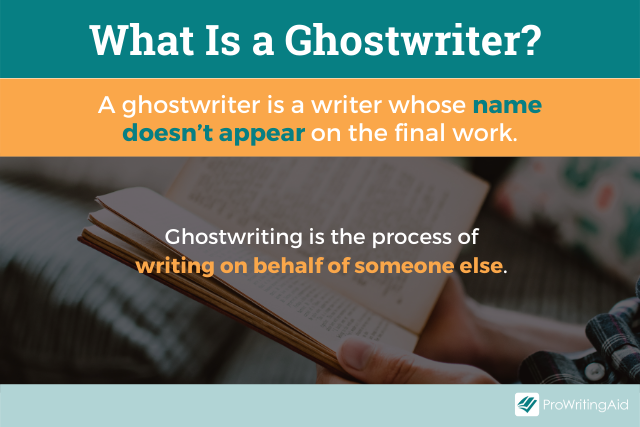
Ghostwritten non-fiction books include My Side by the English soccer player David Beckham, Profiles in Courage by U.S. President John F. Kennedy, and Living History by U.S. Secretary of State Hillary Clinton.
Clients hire ghostwriters to help them create all types of work, from simple blog posts to full-length novels and memoirs.
Most clients fall into the following categories:
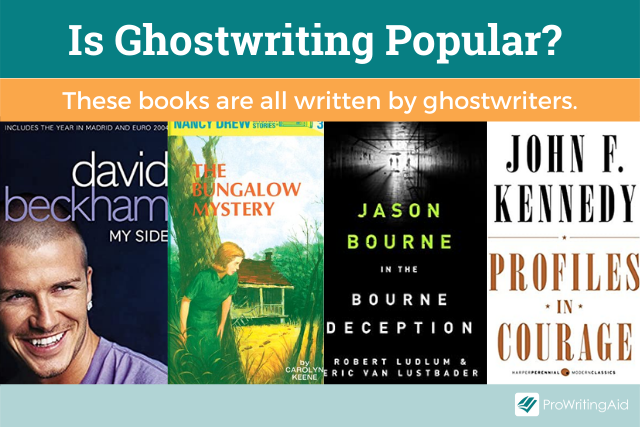
- Bestselling authors whose books are so popular that they no longer have time to write them all on their own
- Industry leaders (such as business owners and health gurus) who want to share their expertise without needing to learn how to write
- Celebrities (such as athletes and actors) who want to share their life stories without writing them themselves
- Bloggers, brands, and businesses that want to post regular content online under their own branding
- Publishers who want to publish more books based on the notes left behind by bestselling authors who have passed away
- Anybody who has a great story to tell, but doesn’t have the writing experience to tell it by themselves
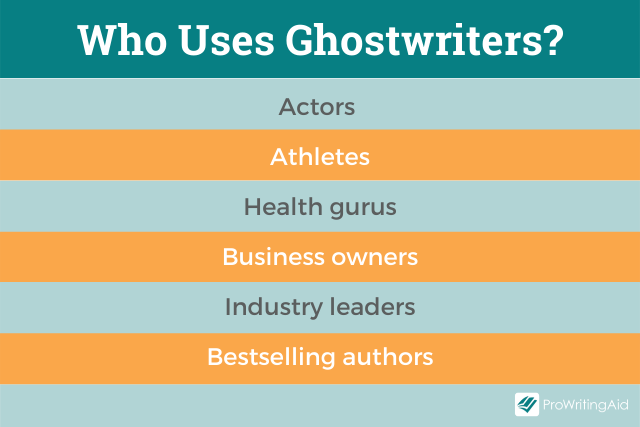
What Is a Ghostwriter?
A ghostwriter is someone who writes for a client under the client’s name.
You can think of a ghostwriter as a type of co-author, except unlike a typical co-author a ghostwriter isn’t given public credit for their contributions to the project.
A ghostwriter’s duties might include:
- Interviewing the client about their vision for the project
- Reading the client’s notes, outlines, or journals
- Drafting an article, story, or book using the client’s ideas
- Revising and polishing a rough draft alongside the client
- Writing in a style that feels like the client’s voice
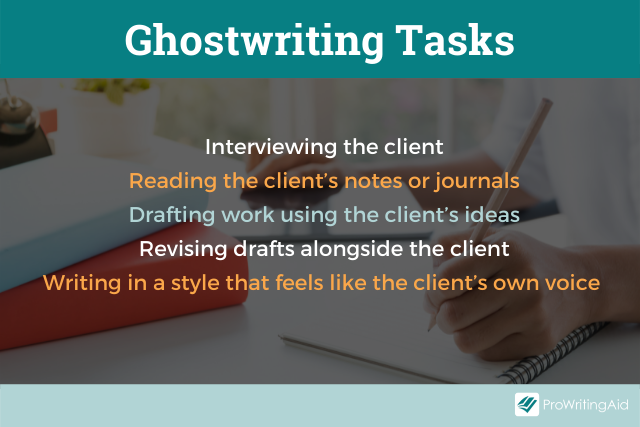
Benefits of Ghostwriting
Why would you want to be a ghostwriter? There are several benefits that might draw you to this career.
Benefit #1: Make Money
Most ghostwriting pays better than general freelancing does.
Clients will often pay a large flat fee upfront, rather than paying you hourly for your time. As a result, you can make a large amount of money very quickly. According to Reedsy, ghostwriters can make a flat fee of $2,000-$70,000 per project.
Fees vary depending on the client. If you can land a ghostwriting gig with a large brand or a well-known author, you’ll probably be on the larger end of that spectrum.
If you’re a freelance writer and you typically set your own rates, you can increase your normal fee by a significant amount in exchange for not attaching your name to your work. After all, you’re charging not just for the writing but also for the credit.

Benefit #2: Build Relationships
Ghostwriters get to work closely with their clients. You might have long conversations together about the project you’re collaborating on. If you’re working on a memoir or autobiography you might even get to read your client’s journals.
Building these close client relationships can give you a strong professional network. Past clients might call on you again in the future or refer you to other people they know who need a ghostwriter.
Benefit #3: Learn About Interesting Topics
Ghostwriting gives you the opportunity to cover interesting topics you might not otherwise get to write about, and to learn things about those topics from an insider’s perspective.
Whatever your field is, you can learn a lot about it by ghostwriting.
For example, you can learn a lot about the tech industry and how it functions if you ghostwrite a memoir for a Silicon Valley engineer. You can learn a lot about the publishing industry if you ghostwrite a novel for a bestselling author.
Benefit #4: Gain Writing Experience
As a ghostwriter, you can practice your writing skills in a very effective way.
Under the name of a well-known client or brand, you’ll be able to reach a wide audience very quickly and see how they react to the way you write. This will make you much better at the craft if you decide you want to build your own brand later on.
It can be helpful to practice writing something you’re not emotionally involved in because you’ll have a clear perspective about the work’s strengths and weaknesses. That way, you can develop editorial skills which will also serve you well in the future.
Ghostwriting allows you to hone your craft without spending time on the other duties that come with creating your own work, such as marketing and publishing. All these tasks are left to the client while you can move straight on to your next project.
10 Tips on How to Become a Ghostwriter
It can be hard to figure out how to become a ghostwriter, especially since the position is one of the least transparent in the writing industry.
Every ghostwriter begins somewhere. It’s just a matter of knowing how to get started.
Here are some tips for breaking into the industry.
Tip #1: Practice Your Writing Skills with Freelance Writing Jobs
The best way to become a ghostwriter is to practice writing as much as you can.
Usually, ghostwriters aren’t amateurs—they’re experienced writers who have created content in their own name in addition to writing for others.
Start by writing in your own voice. Great writing skills will get you noticed by people who are looking for ghostwriters.
One option for gaining writing experience is freelance writing. As a freelance writer, you’ll meet new clients, which will expand your writing network. Writing for clients under your own name will also help to build your credibility because you can demonstrate your writing skills.
If you take on the task of freelance writing, you can use a grammar checker like ProWritingAid to make sure you deliver clear and professional work to your clients.
Another option is blog writing. Blog posts are a great addition to your writing portfolio and can help you develop expertise in a specific topic.
You can also pitch articles to magazines and editors. There are magazines that allow anyone to pitch to them, so keep an eye out for their submission calls. By writing for magazines, you can add some reputable publications to your portfolio.
You can even work on writing books. Many ghostwriting gigs are large projects such as autobiographies, non-fiction books, and novels. Finishing a long work of your own will give you the skills you need to work on one with someone else.

Ultimately, if you’re already an experienced writer or author, clients will naturally gravitate toward you when they need a ghostwriter. Building your writing portfolio is a great way to get started.
Tip #2: Practice Different Writing Styles
Ghostwriting clients will expect you to write in a style that sounds like theirs, rather than like your own. If you want to be a ghostwriter, you should practice becoming a writing chameleon.
Some jobs will require you to write in a conversational, chatty voice. Others will require a formal, informative voice. Still others will require lyrical, poetic prose. If you can master multiple styles, you’ll be able to nail all of these future ghostwriting jobs.
One way to work on this skill is to read widely and pay attention to the styles of the authors you read. Practice imitating the styles of your favorite authors.
Pay attention to the specific words and lexicons each author uses, the length of their words and sentences, and the rhythm and flow of their writing. How formal is their tone? How long are their paragraphs?
These exercises will equip you with the skills needed to create work in your client's voice when you need to.
Tip #3: Hone Your Interviewing Skills
To be a great ghostwriter you don’t only need to be a great writer, you also need to be a great listener.
When you land your first ghostwriting job, you will need to familiarize yourself with the project and the client.
You’ll need to have long, deep conversations with your clients about what they’re looking for and what their ideas are for the project.
You’ll need to practice active listening and ask questions about anything that isn’t clear, so that what you write can match up with the client’s vision as closely as possible.
You’ll also need to read everything they’ve written, whether that’s books, articles, or blog posts.
If you can find any jobs or volunteer work that involve interviewing and research, those skills will set you up to be a successful ghostwriter in the future.
Tip #4: Create a Website for Your Ghostwriting Business
When your future clients are considering hiring you, the first thing they’ll do is look you up online.
You want to make it as easy as possible for all your future clients to figure out who you are, what you do, and how to hire you. How do you do that? You create a writer website.
If you’re on a budget, you can start with a free or low-cost website using a platform like Squarespace, Weebly, or WordPress. Later down the line, you can invest in a website designer to make sure your website reflects your brand.

Make it clear on your website that you’re a ghostwriter for hire. Mention the specific topics you’re experienced at writing about, so everyone can see your brand.
Your website should include some writing samples from your portfolio, such as blog posts or novel chapters. Make sure your samples relate to the type of ghostwriting work you hope to do.
Include a headshot and a short bio so clients can connect with you on a more personal level. You should also include your social media handles, if you have any, and make it clear how potential clients can contact you.
Finally, you can mention the rates you charge or say that rates are available upon inquiry. If you’re a freelance writer you can increase your rates for ghostwriting since you won’t be able to take credit for what you’ve written.
With a clean and professional writer website you’ll be able to reach clients much more easily.
Tip #5: Reach Out to Your Network for Opportunities
Once you’re ready to start ghostwriting it’s time to reach out to anyone you know who might need a ghostwriter.
If you’re an experienced freelance writer you might have a network of clients you’ve worked with in the past. Don’t be afraid to reach out to them and ask how they’re doing, and if they know anyone who has ghostwriting needs.
Even if you don’t have a client network, there are still other people you can reach out to. Maybe you know someone who has a great book idea but doesn’t know how to write it. Pitch your skills to other writers you know, and even to your friends and family.
Tip #6: Pitch Your Ghostwriting Services to Businesses and Brands
It might not seem obvious but many businesses and brands have writing-related needs, even if their services have nothing to do with writing.
At the very least, almost every large company has their own website with descriptions of the company’s services.
Many companies have blogs where they post about their work to attract more customers. Some release their own eBooks to establish themselves as thought leaders within their industry.
So who writes those websites, blogs, and books? Chances are, that’s a perfect job for a ghostwriter.
Start with businesses you’re familiar with, maybe ones you’ve been buying from for years or ones in industries that you have expertise in. Send them an email mentioning that you love their products, and tell them about your ghostwriting services.
Don’t be afraid of rejection. The worst case scenario is that the company says no, in which case you can respectfully accept that decision and move on to the next potential client.
At the end of the day, finding clients can be a numbers game. If you pitch to enough brands with a strong writing portfolio, sooner or later one of them might say yes.
Tip #7: Utilize Social Media
In the age of information, social media is one of the best places to find freelance writing opportunities and that includes ghostwriting opportunities, too.
Update your Facebook profile, Twitter profile, and any other social media profiles to include your ghostwriting skills. Make sure everyone can see that you’re a ghostwriter for hire.
On sites like Twitter, you can search for specific hashtags, such as #ghostwriting and #ghostwriter. Sometimes, people will post opportunities under these hashtags, or stories about their own ghostwriting experiences.
Joining these communities will help give you a foothold into the industry.
Tip #8: Join a Job Board or Publishing Marketplace
There are plenty of websites that offer different writing jobs, some of which include ghostwriting opportunities.
Many job boards don’t explicitly offer ghostwriting gigs, but they offer many freelancing gigs by brands and businesses that might also need a ghostwriter.
Here are some job boards you can consider:
- All Freelance Writing is a free job board that has fully vetted gigs.
- Contenta is a job board that tracks companies that hire writers. You can reach out to the companies that have posted ads and ask if they need a ghostwriter.
- Upwork lets you create a profile and advertise yourself. You can also see the profiles of other ghostwriters and compare your rates to theirs.
- Freelancer.com is a site where you can bid for freelance writing opportunities.
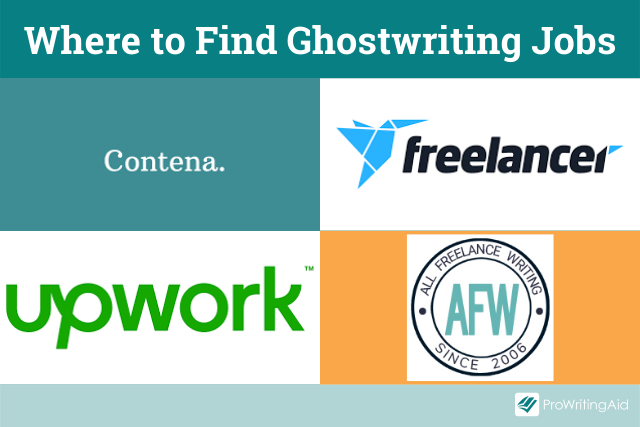
Tip #9: Understand Your Contracts
When you start signing ghostwriting contracts, have a lawyer look at your legal paperwork if possible. Taking that precautionary step will help you protect yourself from any possible legal ramifications.
In some cases, ghostwriting is transparent and the client will make it publicly known that they have a ghostwriter.
In most cases, however, a ghostwriter must sign an agreement not to reveal the project they’re working on or take any credit for the completed work.
Often, contracts will allow you to speak about your projects in general terms so you can tell future clients about your previous ghostwriting experience.
For example, you might be able to say, “I helped a client write a 300-page memoir which hit the New York Times bestseller list.”
Read your contracts carefully, and never share information about your projects publicly if your contracts tell you not to.
Tip #10: Be Patient
Ghostwriting is a job that often takes a long time to pay off.
Don’t worry if it takes a while to make it big! Success as a ghostwriter depends on two factors: luck and preparation. You can’t always control the luck factor. All you can do is make sure you’re prepared for the next time a ghostwriting opportunity comes your way.

Is Ghostwriting for You?
If you’re trying to decide whether being a ghostwriter is the right path for you, ask yourself some questions about what you hope to gain out of it.
First, ask yourself what you want to accomplish as a writer. If you’re trying to build your own platform and writing brand, ghostwriting might not be the right choice for you.
If however you want to make some good money and create a stable income stream, ghostwriting can be a great option.
You should also ask yourself if you have the right personality for ghostwriting.
If you hate the idea of someone else taking credit for your work, or the idea of giving up creative freedom over what style you’re allowed to write in, ghostwriting might be difficult for you.
On the other hand, if you’re very flexible and love collaborating on projects, you might be very successful as a ghostwriter.
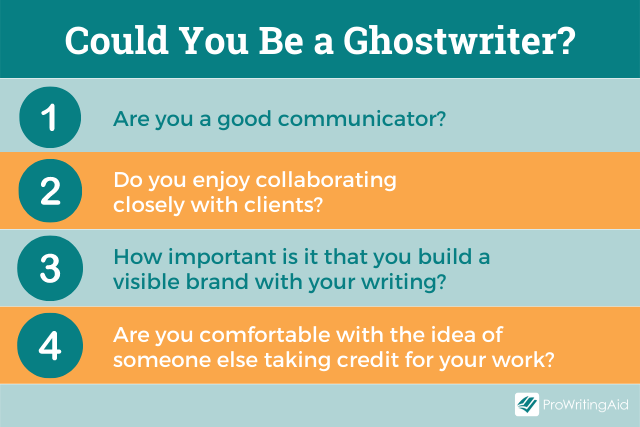
Do you think ghostwriting might be a good option for you? Why or why not? Let us know in the comments.


